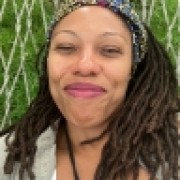Mariam I. Williams
I write to find answers, dance to find joy, and teach to build and grow in community. Though I shift between and through and around memoir, essays, and poetry; choreography; and workshops, courses, and programs, my creations have a common theme: center, celebrate, and affirm Black women. In the process, my work reveals black humanity, gives dimensionality to Black womanhood, and provides new ways of thinking, healing, and being for all people.
Awarded Grants
2024
Window of Opportunity Grant (WOO)
Overview
Mariam I. Williams will be attending the International African Diaspora Dance Traditions Conference (IADDTC), which will be held August 4th-10th in Salvador da Bahia, Brazil.
This conference will explore ancestral resistance to the repression of African diaspora cultural practices and what it can teach in the present anti-Black climate. Mariam will take dance classes and partake in interactive workshops to revisit dormant questions through cross-cultural exploration, embodied research, and scholarly inquiry; connect with multiple practitioners and scholars in one setting; and focus on themes specific to her past, present, and future work. She will also have the opportunity to visit Museu Afro-brasileiro da Universidade Federal da Bahia (the University of Bahia Afro-Brazilian Museum).
The WOO grant will help cover roundtrip airfare, conference registration, partial meal costs, as well as dance supplies.
2021
Art and Change Grant (ACG)
Overview
Mariam's project is a deep reading and creative writing class series that explores counternarratives to the Jezebel trope. Inspired by Black women's fiction, poetry, and religious studies scholarship, participants will be invited to challenge Black church and Black pop culture stereotypes and write their visions of bodily autonomy, pleasure, and freedom. Class sessions will be held at Frannie Lou's Porch and will incorporate conversation, reflection, and journaling as well as movement based practices. Mariam aims to create a space for Black women the space to reclaim some of the knowledge of ancient practices they carry within their cellular memory and to question and carefully examine the teachings, cultural influences, family, and religious practices that have led them to live out anti-blackness in intimate ways.



